This blog post was written for The Greer Garson Blogathon hosted by Phyllis Loves Classic Movies.
Greer Garson is hands' down my favorite version of Elizabeth Bennet, with Elizabeth Garvie of the 1980 version coming in a close second. Greer was an unusual choice for the role in that she had only been in Hollywood for a short time, having begun her career on the stage. A woman of winsome refinement and a cultured voice, Greer joined Hollywood in 1937, when she was already well into her thirties. By the time she played Elizabeth Bennet, Greer was 36-years-old, but age bore no relevance whatsoever to the role. Greer played Lizzy Bennet with such success that the role skyrocketed her towards fame.
Go to my Classic Hollywood page to find all my Classic Hollywood reviews!
As a London stage actress of great success, she was approached by Louis B. Mayer of MGM and was signed to a seven-year contract in 1937. Unfortunately there proved to be some difficulty in casting her in suitable roles os she did not begin her film career officially until late 1938, where she starred alongside Robert Taylor in Goodbye, Mr. Chips, which earned her much acclaim upon its release in 1939 and her first Oscar nomination. Unlike many actresses who worked their way up the food chain, Greer was in an unusual position. Greer also proved herself to be stubborn in that she refused to accept secondary roles to get her started. So while her beginning was slow, she was a leading lady right from the start, a marvelous feat of power for the era.
Released in 1940, Pride and Prejudice was Greer's third film and solidified her as a Hollywood favorite. Cast along such popular names as Edmund Gwenn, Laurence Olivier, Edna May Oliver, and Maureen O'Sullivan, Pride and Prejudice was a rousing success for Greer. A flirty and fun historic, romantic comedy the 1940 Pride and Prejudice never takes itself too seriously and was a perfect venue for such an elegant and spunky actress as Greer Garson.
For the unfamiliar, Pride and Prejudice is a story by Jane Austen, originally published in 1813. The era is supposed to be the Regency, renowned for its gowns with the empire waist. For some unknown reason that still boggles fans today, the costumer for the 1940 film did not choose Regency costuming but instead chose an era about 20 years after the Regency. It is often a cause for much perplexity by fans, but I never cared that the costumes weren't, strictly speaking, "correct." Instead, I just admire the gowns because they are LOVELY and the style suits Greer so very well. I'm all for layers of frothy organza and frills.
Fortunately, this version of Pride and Prejudice is easy to follow and simplifies the story enough that it doesn't take 3 hours to tell. The Bennet family has been blessed with 5 daughters but cursed with the reality that the Bennet estate of Longbourn will be entailed away to the closest living male relative. Mrs. Bennet (Mary Boland) spends half her time in a panic over this reality and the other half trying to track down husbands for her daughters. Elizabeth (Garson) is the eldest daughter, a change from the book where she is second eldest to Jane, likely because Greer just seems like she would be the oldest sister, followed by Jane Bennet (O'Sullivan), a charming and innocent girl of roughly 18-years-old, and then Mary Bennet (Marsha Hunt), Kitty Bennet (Heather Angel), and Lydia Bennet (Ann Rutherford). Mary is a bookworm with little interest in anything other than books about the sublime and beautiful or Fordyce's Sermons. Kitty and Lydia are the most foolish girls in the entire county, causing their older sisters much aggravation that only heightens as the film progresses. Mr. Bennet (Gwenn) is a much-tried man who wishes he could just sequester himself in his library but is often called upon to give advice and offer his opinion. A non-entity of a father at times, he is still basically kind to his daughters, likely due to the kindly features of Edmund Gwenn who doesn't seem like he could be anything else.
When two eligible young men put in an appearance in town, all of the mothers in the village go into an uproar in trying to obtain one of them for one of heir eligible daughters. At the ball where the men are first introduced, it becomes quite clear that Mr. Bingley (Bruce Lester) is a charming and agreeable young man of excellent manners and a decent fortune. Unlike his friend, Mr. Darcy (Olivier), who immediately appears cold and empirical and downright rude to the guests of the ball. Elizabeth takes affront when she and her best friend Charlotte Lucas (Karen Morley) overhear Mr. Darcy telling Mr. Bingley that there wasn't a single girl present that it would not be a punishment for him to stand up with. Insufferable man!
Unfortunately, Elizabeth knows how to hold a grudge, and so she does. Even when her sister Jane develops an attachment to Mr. Bingley. Even when Mr. Darcy begins to soften and even flirt with her when he's in the comfort of the company he knows best. She still burns with the insults he so openly expressed at the ball. Still, there is something about him, and after Jane catches a cold on the way to dinner at Netherfield Park (Mr. Bingley's residence), and Elizabeth feels compelled to go and care for her. In so doing, she gets to know Darcy better, and she finds there is something intriguing about him. If only he wasn't so insufferable.
Alas, Mr. Darcy isn't the only insufferable man to put in an appearance. Cue Mr. Collins (Melville Cooper), Mr. Bennet's cousin who will be the heir to Longbourn. His visit to Longbourn is with the sole intention of choosing a wife and he has selected Lizzy. Naturally, since the younger daughters are absurdly silly and Mary, well, poor Mary. She probably would have suited Mr. Collins best, but indeed no, it is Lizzy he must chase.
Now, not only does Elizabeth have Mr. Collins hunting her down at every opportunity, but Mr. Darcy is beginning to act peculiarly as well. I must pause a moment to discuss Laurence Olivier. He is magnificent as Mr. Darcy. There is no other word for him. he begins frigid and stiff, just as one expects of Mr. Darcy, but warms as the film carries on. Mr. Darcy is witty and charming and seductive all at once in the hands of Laurence Olivier. Greer and Olivier were an ideal match for the witty banter replete throughout the script. Their age gap of him being 3 years younger made no difference whatsoever!
Drama must ensue, of course. Much of it is caused by Lydia, the youngest of the Bennet girls, who runs off with a military officer known as Mr. Wickham (Edward Ashley Cooper), a dastardly man with whose deeds Mr. Darcy is quite familiar. A frightful scandal falls upon the Bennet household, endangering their good name. On top of that, Lizzy has also refused Mr. Collins who then proceeds to marry elsewhere, not within the family. Those of us who dislike the idea of cousins marrying cousins heave a sigh of relief.
Then I'm afraid Mr. Darcy chooses a poor time to propose marriage to Lizzy, immediately after she discovers he broke off the burgeoning relationship between Mr. Bingley and her sister Jane, all because he believed that Jane didn't truly care for his friend and was only chasing his fortune. To say nothing of Jane's quirky family being entirely unsuitable, a silly thing to bring up considering Mr. Darcy himself is willing to marry into that very same family. Her refusal is absolute, but no sooner is he out the door in embarrassed humiliation then she begins to regret her rashness. Ahh, Lizzy, that temper of yours gets you into trouble. This is a marvelous scene between Olivier and Garson, full of passion and energy. Hell hath no fury like a woman scorned and all that. Olivier's eyes look like he's being attacked by a crocodile.
Throw in Edna May Oliver as Darcy's aunt and Collins' employer, Lady Catherine de Bourgh, and you have a full set of crazy.
In the vein of all good historic romantic comedies, Pride and Prejudice ends happily for almost everyone. My twenty-year-old heart sighed with satisfaction all those years ago, just as it does today. The story does deviate from the book in some ways. A few things are left out, like Elizabeth and her aunt and uncle touring Mr. Darcy's home. Mr. Collins' character is not a vicar in this version, but rather Lady Catherine's librarian. I'm not sure why they made the change to his profession, but oh well. And Lady Catherine herself, well, she is very different at the end. Her alteration of character I don't necessarily mind, but it is a strange one.
In the end, I don't care that the 1940 Pride and Prejudice isn't 100% on point with the original story. It's a charming and lighthearted interpretation of a classic story whose casting choices were perfect. Greer is a marvel in this movie. I absolutely adore her, from every witty comeback to the realization that she actually loves Mr. Darcy. And Laurence Olivier, well, al of the other Darcys have much to live up to in my book to even compare with his rendering of this classic, broody hero.
I hope you enjoyed my post. If you did, I hope you track down a copy of the movie to watch and that you love it as much as I do. Also, I hope you'll take the time to visit The Greer Garson Blogathon page hosted by Phyllis Loves Classic Movies for other links to other reviews.


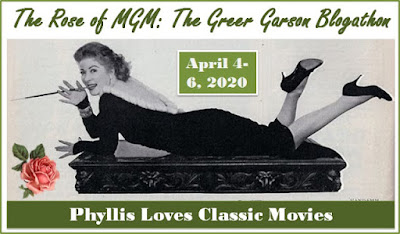

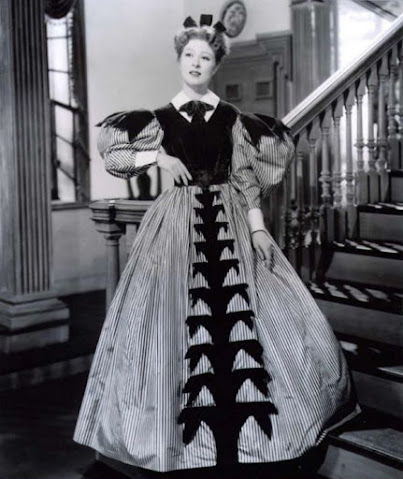
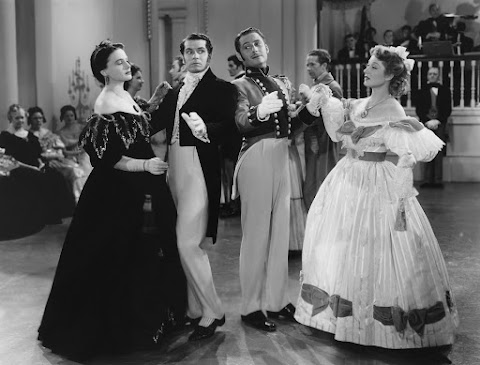
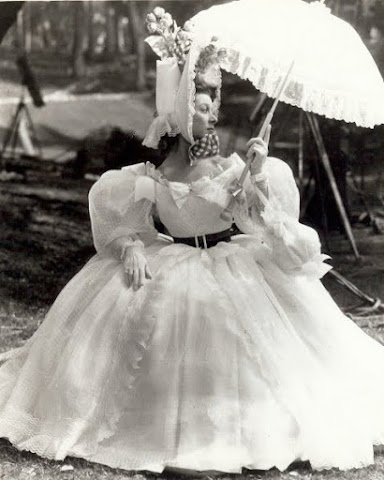
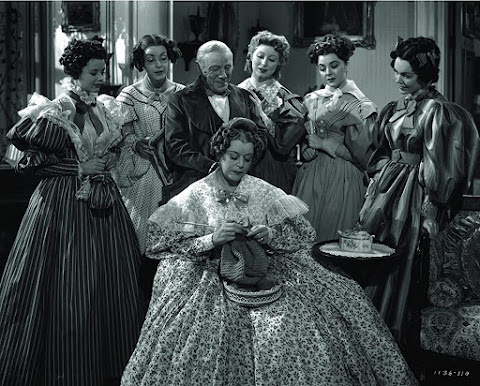


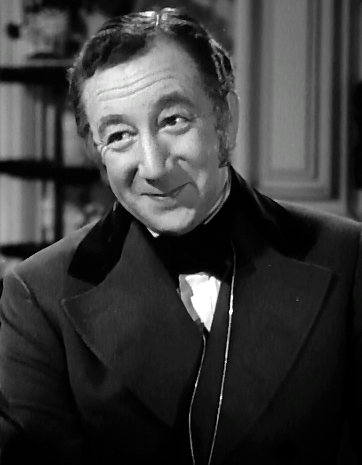
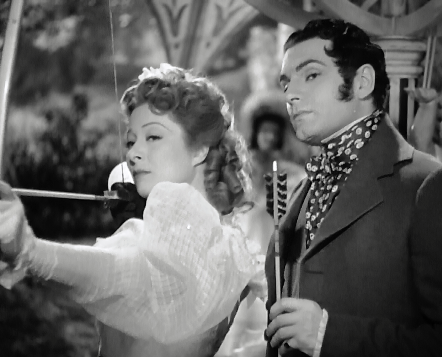




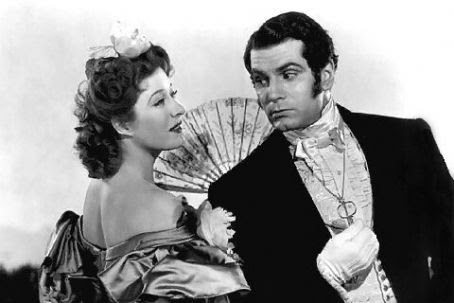


Wonderful review!! Love the photo of Garson looking sideways with the bonnet!! I think this is also the first Garson and Olivier movie I saw. They really are perfect in their roles (The only other version I’ve seen is the one with Kiera Knightly which I did not like). My favorite part is when Mrs. Bennett tells Marsha Hunt to sparkle. “Just a little!”
ReplyDeleteThanks so much for participating!!!
I was happy to participate! It was lots of fun.
DeleteI suspect at this time that scripts had to pass strict censorship boards and since there were a great many pastors on the board, they may have thought making the much-hated Mr. Collins was an attack upon the morals of the clergy and/or would offend the general public, which could impact movie sales.
ReplyDeleteHas Greer ever worn anything from the Regency period? It's possible they thought she and the other actresses might look less romantic or 'old fashioned' in those thin dresses? I don't know, I will never know what Hollywood was thinking at this time. (It may have been to capitalize on the fashions of Gone with the Wind, which enjoyed enormous success, also.)
I hadn't thought of that, but you may be right about Mr. Collins. In classic Hollywood, pastors and ministers were usually portrayed more kindly. So it might have been awkward to let Mr. Collins be a vicar and so obviously idiotic and simpering.
DeleteI think this might be her only true historic piece, actually, so I've never seen her in Regency garb. She did a lot of 'modern' roles, ones from her own era, and she was always very well suited for them. I actually need to watch more of her movies. She is one of my favorite actresses just because of the way she approached her roles. And she wasn't a bombshell, just a lovely woman, so that's saying something. I do get tired of the bombshells from classic Hollywood since there were so many of them!
I thought the same thing when I watched it last time--"Why are they in Victorian costume?" It didn't bug me as a kid, but now it's all I see. The movie is still awesome, though, lol.
DeleteIt's always so funny when they get it close, but not quite right! ;)
DeletePride and Prejudice is my favorite Jane Austen, and this looks delightful! I really want to see this now. Your review made me laugh in a few places, too, so thanks for that!
ReplyDeleteIt really is a lovely and fun film! I'm glad you enjoyed the review and if you do get a chance to see the film, that you enjoy it! Thanks for stopping by! :)
DeleteI'm glad this is still open as I was looking for some discussion about the wonderful Greer Garson and this version of Pride and Prejudice. It was the first version I saw as a young girl, before I'd read any Jane Austen, and I remembered it for Greer Garson and the handsome Lawrence Olivier. I thought I had seen most if not all Greer Garson movies but during the Covid pandemic found a wonderful Greer Garson-Walter Pidgeon (such a wonderful chemistry between them, i.e. Mrs. Miniver, and it's sequel). It is called Scandal at Scourie. I think we have watched it at least a dozen times since. So cute, and technically a period costume piece, set in Victorian age Canada interior.
ReplyDelete